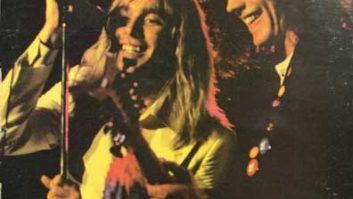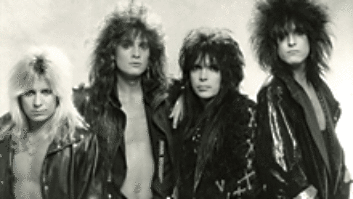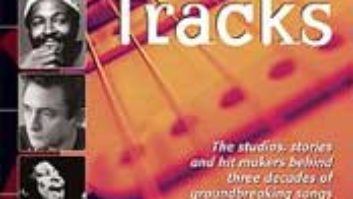HEAVY METAL MASTERTom Werman has had a remarkable career by anyone’s standards. As a record company A&R executive, he has signed and successfully launched at least half a dozen major acts. As a record producer, he has notched up sales of 40 million-plus, and his two-dozen Gold and Platinum records span the ’70s, ’80s and ’90s.
Starting at Epic in the early ’70s, Werman held executive positions at Elektra and EMI/Capitol, interspersed with successful stints as an independent producer. Though his credits range from power pop tunemeisters Cheap Trick to Southern rockers Molly Hatchet and Mother’s Finest, from new wavers The Producers and Gary Myrick & The Figures to industry faves Jason & The Scorchers, Werman is best known for his work with an extensive catalog of hard rock and metal groups. Starting with original Motor City madman Ted Nugent, Werman went on to produce key records by Motley Crue, Twisted Sister, Poison, L.A. Guns, Krokus, Stryper and Dokken. If not exactly the father of heavy metal, Werman was certainly not far away when it was conceived.
However, as heavy metal and its subgenres have splintered and evolved, Werman has found himself less in demand as a producer. But, if temporarily out of fashion, he is a long way from retirement. Most recently, Werman produced the music for the Warner Bros. Pictures project variously known as Metal God and Rock Star. Loosely based on a story that first appeared in The New York Times in about 1985, the script revolves around the lead singer (played by Mark Wahlberg) of a tribute band who is invited to replace the ousted singer of the band whose music he has been covering.
Tracks were recorded at Conway and the Record Plant in Los Angeles, with most of the overdubbing and mixing completed at Record Plant. Eddie DeLena engineered. “He’s great. He’s just great,” says Werman. “He’s focused; he makes it very easy in the studio. He’s very sensitive to people’s needs, wants and predispositions. And we do a lot of laughing.”
Though the sessions may have been laughter-provoking, they were also fast and furious. “We did all the drum tracks, all the bass tracks and some of the rhythm guitar at Conway, all in a week. We steamed,” recalls Werman. “All of this had to be very quick. We were still looking for songs and writing songs. So when we got to Record Plant, there were a couple of days when we actually got a song in, ran it down, recorded it and mixed it the next day. We did a couple of songs in 24 hours. We actually recorded 15 tracks. Some will be in the movie, but I think there are basically eight major songs. Parts of the others may be in the movie.”
Tracks Werman has produced appear on several soundtracks, but this was the first time he had been involved in creating original music for a film. He recalls that it was Gary LeMel, president, worldwide music, Warner Bros. Pictures, who first suggested Werman to the film’s music supervisor, Budd Carr.
“We initially spoke a year ago last spring,” says Werman. “Since the film is set in 1985, it’s not too surprising that they asked me to do it. So we talked about it, we exchanged ideas about the music, I read the script, and then they said, `Okay, let’s go.’ I worked very closely with a guy named Bob Schaper, who does all the film mixing and all the magic. We met for breakfast, and he said, `Just do what you normally do, and I’ll do the rest.’ And I was relieved to hear that, because I was a little bit concerned about the differences between movie music producing and record producing. Actually, there was no real difference, except that you are a service center, and you have to provide arrangements immediately on demand. So you can finish a song and deliver a song, and they can come back to you one day, in the afternoon, and say, `We need this version of that song with a double intro, no vocal and an extended guitar solo – by tonight.’ So there was no real opportunity to just work on our own schedule. And I think it’s probably always that way.”
One unusual aspect of this project was that the script called for some of the same music to be played by two different bands. “That was the tough part,” notes Werman. “We had two weeks to rehearse a band on eight songs. And this band was supposed to sound as though it had been together for 15 years. [Laughs.] And I think we did it. Then, on top of that, we had to record many of the same songs with another band, with only one musician in common. They were supposed to be very good, but not quite as good as the band to whom they were paying tribute.”
For the “A” band, Carr and Werman recruited drummer Jason Bonham and guitarist Zakk Wylde. “Zakk was with Ozzy for quite a while,” says Werman. “And he is unique. I would stake my life on the fact that he’s among the five fastest guitar players in the world. His composition is excellent, and he’s an astonishing player. His style is good for 1985, but it has a very current flavor to it.
“On bass, I picked Jeff Pilson, because I had worked with him previously in Dokken,” he continues. “He’s an excellent team player. He’s a very focused musician and certainly familiar with the period. And when you get two guys like Zakk and Jason, who are fairly radical rockers, teamwork isn’t always the first thing on their minds. So I wanted somebody like Jeff to be an ally and to kind of be the musical director in the band. And for the most part, everything came out as well as I would have liked, or better.”
Arrangements were worked out by the musicians and Werman. “We did it as a team,” he says. “They detuned drastically so that guitars were in sub-Metallica range. In other words, the bottom two strings, the E and the A strings, were, I think, tuned at least as low as Metallica, if not lower. About 10 years ago, guitar bands started detuning so that they could get a more aggressive, gnarly sound out of the guitar. Very little of that was going on in 1985, so the songs in the film are all in the year 2000 register, with 1985 lyrics and arrangements.”
For the “B” band, Werman used Blass Elias, the drummer for Slaughter, and Brian Vander Ark of The Verve Pipe on bass. Nick Catanese, the rhythm guitar player in Zakk Wylde’s band (Black Label Society), was the lead guitar player for the tribute band and had the unenviable task of trying to copy Wylde’s licks. “And that is not easy,” comments Werman. “In fact, it’s almost impossible.”
Despite the sometimes-frenetic schedule, Werman managed to meet his usual high professional standards. “There were very few compromises,” he says. “I really like what we got. I think it’s slammin’ rock ‘n’ roll.”
Let’s go back to the beginning of your career. You played guitar in college, right? Yes. I had a good collegiate music career. And in 1965, I jammed at Ondine’s with a then unknown Jimi Hendrix – twice. I continued to play guitar in business school. And then I went into advertising and hated it, and bailed after a year and went into rock ‘n’ roll at CBS Records.
How did that come about?
I simply wrote a letter to Clive Davis. I told him that I had a job, that I was in marketing, that I didn’t want to be in marketing, that I knew a lot about rock ‘n’ roll, that I had an MBA, and that I thought CBS was the kind of sophisticated business organization, for a record company, that could use me. I interviewed with a few people over there, and they hired me to be the assistant to the director of A&R at Epic Records.
When I joined, Epic was billing 12-and-a-half million dollars’ worth of records a year. When I left, it was billing, I think, 250 million. So there was explosive growth in that period for Epic. And it was just a fabulous place to work. A fabulous time, a time of incredible growth in rock ‘n’ roll’s popularity.
I started in 1970, and I left in ’82. It was just the most wonderful thing. There was no job description. It was a very, very informal and very seat-of-the-pants operation. My initial boss was a complete blues freak. He knew the blues and jazz up and down, back and forth. He knew very little about rock ‘n’ roll. So I was the rock ‘n’ roll guy. I was the all-purpose talent scout. I’d go out and I’d see bands and listen to demos, and I would have appointments with people who would come in and play their stuff for me. I immediately signed REO Speedwagon, and that was okay. I brought them three bands that they turned down, which went on to be gargantuan. And after six years, the head of promotion at Columbia was made head of A&R at Epic, and he asked, “What are you doing here? What have you been doing all this time?” I replied, “I’ve been editing all of the album tracks for single releases, and I’ve been trying to sign bands and being turned down. I guess I just didn’t pound the table hard enough for these bands – I was turned down on Kiss and Lynyrd Skynyrd and Rush.” And he said, “Is there anybody you like now?” And I said, “Yeah, I like Ted Nugent,” and he allowed me to sign Ted. Ted was on his own for the first time without the Amboy Dukes, and his manager was shopping him. I wasn’t very excited until I saw him, and then I said, “Wow. We can make records with this guy.” I kind of appointed myself as the associate producer – the manager had a production deal with Ted, so he called all the shots. But because I was with the label and could ask them for more money, I was able to remix the record after the manager mixed it. I remixed it with the engineer, and it went Platinum. So, bang! I was a producer.
That was the first record you had produced, right? Did you go in with confidence, or were you quaking in your boots?
No, I was rarin’ to go. Because I had been listening to substandard records for six years and thinking, “Gee, I could do better than this.” And I didn’t. I had a lot to learn, and I did make some bad records to start with. But Ted’s record was the first and that was closely followed by Cheap Trick. I signed them to Epic.
But the first album was produced by Jack Douglas.
Right. He was the one who called me and asked me to go see them. He had already started working with them, so he did the first album, which was great, but not terribly commercial. And then he was busy with Aerosmith, and they asked me to do the second. I did it and it was more commercial. My job at that time was to simply get bands on the radio. So that’s what I did. In other words, anything in the song that was vaguely commercial, I had to bring out. And I did.
Apart from Ted, that was the first band that you had worked with seriously in the studio.
Cheap Trick? Yeah. It was all mine. I didn’t have any co-producers. I was allowed to do whatever I wanted, which was the most fun I ever had, basically, in the studio. We recorded at the Third Street Record Plant in L.A. – the old one, the fabled, the famous one. The band told me they wanted to record in L.A., and I’d never been there to record. I came out, and we did the first part at Sound City and mixed at the Record Plant. And that was In Color.
Then, in 1978, I moved from New York to Los Angeles. I came out here, and it was completely different. In New York, the entertainment business is just one of many. Here, it’s all there is. The entire focus is on the entertainment industry, and there are so many services that make it so easy to work here. So many rental companies, so many sound reinforcement companies, so many piano tuners, so many guitar stores, so many studios, so many engineers, so many musicians. It was just heaven. I came out here, and I moved into the Record Plant, and I did 16 records there. I hardly surfaced.
So here you are on staff at Epic, and you’ve got a monster hit with Ted Nugent and you’ve got Cheap Trick going. Did this change your profile in the company?
Oh, yes. I started making a decent wage, although very little compared to what they make today. Then I signed Molly Hatchet and continued with them. So I had quite a few hits going on at the same time. Actually, three different acts in the Top 40 album chart at one time.
I had a couple of bands that I signed that, unfortunately, for one reason or another, were not successful. I still think they’re great, and it’s really too bad that they didn’t get the treatment they deserved. And I also made some stiff records, no question about that. Not bad, just not good enough. Every producer can’t bat a thousand. From a statistical point of view, I’ve probably batted about .350. More than one out of every three albums I did went Gold or Platinum. I did about 65 albums, and I have 25 Gold or Platinum records, including Best Ofs, at the moment.
I know that you have a hand in the arrangements, and obviously the song selection and the radio edits and bringing out hooks and so on, but you’re also listed all over the place as adding percussion.
Right. I do play all sorts of hand percussion. Everything but congas. It’s just a little flavor, a little touch. And I always enjoyed it. I always made the same offer to every band: “I’ll do it for free. You listen to it and, if you don’t like it, we can hire somebody.” And they always liked it. I did it in a hurry, I didn’t spend any money, I didn’t get paid. I stopped taking credit after a while. It’s just another part of the arranging function, really.
And you’d typically bring in a keyboard player at some point?
Yeah, if there wasn’t one. I used two main keyboard players, Jai Winding in the early days and then Paul Fox. I also enjoyed working with Michael Boddicker.
Tell me about your recording methods. Did you ever change your process?
I didn’t change procedure that much, but what was recorded and how it was recorded was different according to each band. I didn’t just say, “I always use a 47 for vocals and an 87 for…whatever.” I don’t do that. Each recording project is tailor-made for the band and the band’s sound. We use different studios, but the procedure always remains basically the same, which is get the basic track done, get the drums and bass done, and put on the rhythm guitars and then put on the lead, the vocals, see what happens. Color it, arrange it.
Did you have a mentor figure when you started producing?
Yes and no. I loved the way Glyn Johns made records. I thought that Who’s Next was probably the best rock ‘n’ roll record ever made at the time. I loved The Eagles’ first record. It was almost too good. I just like what he did. His credits and his sound, the way the music sounded to me on stereo headphones, loud. I identified him as the guy whose records I really enjoyed, and he must be a great producer, and how can I do that? That was really it. He was the guy. But he wasn’t a mentor – he didn’t know who I was. And Pete Townshend was the other inspiration. When I signed Ted, I initially wanted Townshend to produce Ted Nugent.
Kind of a mind-boggling thought.
Yeah, think about it. I met his lawyer on the plane back from Chicago, after I first saw Ted, and I brought up the idea to her, and she laughed. Then later on, after Ted’s album went Platinum, she sent me a letter of apology and congratulations, which was very nice of her. Years after that, I did meet Pete backstage when Mother’s Finest was opening for The Who on tour. It was great. Unfortunately, he’s shy, and he didn’t talk too much, but it was good enough for me.
Were there bands you could record in one take, or did everybody have to be built up?
Cheap Trick were pretty competent as musicians. Motley Crue was more of a layer-by-layer situation, as was Poison and Twisted Sister. Nikki Sixx is an accomplished bass player now, but when we started out, he was not up to Tom Peterssen. Robin Zander is as good a vocalist as anybody could ever work with. Cheap Trick was fast, fun and good.
I don’t mean to open an old wound, but why did they go off with another producer?
They went off with George Martin, actually, who surprisingly made a stiff record. And I wasn’t glad to see that, but at least I understood then that just because you happen to be the most famous producer in the world doesn’t mean that everyone’s going to play or buy the record that you make. I always said Cheap Trick wanted to be The Beatles, and I wanted them to be The Who. So it was a good combination. We were a good combination.
I don’t know why they went off. I don’t know why anybody goes off. Motley Crue went to Bob Rock and made a killer record after I worked on three of their records. Twisted Sister left after one record, because Dee Snyder wasn’t interested in sharing any credit. He didn’t want people thinking that I really had anything to do with that band’s success, because he’d been working so hard at it for so long. You never know. I did a record with Poison that sold 5 million copies, and it was not an easy record to make, and then they went to somebody else. I’m not drawing any major conclusions from this, but with the exception of Motley Crue, every other band I’ve worked with had their biggest record with me. And soon after they switched producers, they disappeared. So you be the judge. [Laughs.]
How do you think the business has changed since you started?
A&R people don’t sign as many bands out of clubs as they used to. They don’t sign as many bands that haven’t proven themselves. You have to have a very compelling story to take to an A&R man before he will consider signing you. You have to be selling records somewhere. There is very, very little artist development. There are very few instances of A&R people signing bands on pure musical passion or faith, and then working with them again and again and again until their musical vision is finally realized. As in Springsteen’s case, for instance. That wouldn’t happen today. You sign a band, it makes a stiff record and it’s gone, generally. You don’t get to sign the band unless there’s a very strong radio cut to start with. So it’s quite different now.
I can’t think of anyone who’s worked with more bands that strike fear and terror into the hearts of parents across the nation. Is that unfair?
No, it’s true. It’s probably true. Motley Crue was…they weren’t posers. They weren’t pretending. They’re great guys, but they lived fast and hard, no question about it.
How did that affect your working with them or your socializing with them?
I enjoyed it. I enjoyed the outlaw association. I enjoyed coming from a very balanced home life and dealing with this lunatic fringe. And then returning to my very sane home, with my wife and my children and my dogs and my cats.
I recently came across a book of interviews with record producers and it kicked off your interview with: “Tom Werman is a bitter man.”
Yeah. I was bitter at that time. That was quite a while ago, and I regret giving that particular response to those questions. The fact is that when you have 25 Gold and Platinum records as a producer, and you’ve had 14 years of label experience and an equal number of years of independent producer experience, and a master’s degree in business, and you can’t find a job and you can’t get a project, it’s very frustrating. It’s that simple. So at the time, I was angry. I’m not angry anymore, but I must admit to still being puzzled about why so few people are interested in taking advantage of the experience that I have. I know that I have colleagues and peers who are in the same position.
Part of it is age. Part of it is the musical association with hard rock. I have to say that, probably, some people just aren’t willing to believe that anybody who did Ted Nugent and Twisted Sister and Motley Crue is capable of doing anything today. But a pop record is a pop record. And I don’t mean Britney Spears or ‘NSync. I mean a guitar band that sings and plays, regardless of whether they have a DJ with them or not. It’s beyond me, actually. It’s just beyond me. I love music. It’s my number one passion in life, and it’s frustrating that the industry as a whole appears to have no place for somebody with my experience. I can be useful in teaching people how to make better records for less money and troubleshooting projects. Just being a creative behind-the-scenes person. I’m not at the point in my life where I’m willing to say, “Okay, that was my career. It was a good one, but it’s over.”







